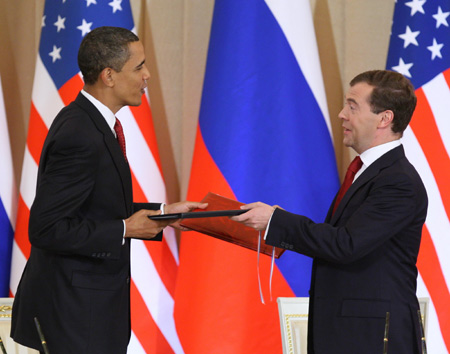
|
|
U.S. President Barack Obama and Russian President Dmitry Medvedev exchange agreements during the signing ceremony in Moscow, capital of Russia, July 6, 2009. Obama and Medvedev signed a joint statement on anti-missile issue and a new arms reduction agreement in Moscow on Monday. [Lu Jinbo/Xinhua]
|
US missile defense shield
Medvedev and Obama also signed a joint statement on the U.S. anti-missile shield in the Eastern Europe. Based on their consensus reached early this April in London, Russia and the United States plan to further discuss the issue.
The leaders have agreed to assign experts from both sides to analyze potential missile threats on world security.
The Bush administration had plans to station elements of a missile defense system in Poland and the Czech Republic to counter the threats from "rogue states" like Iran.
However, Moscow has long voiced strong objections to these plans, saying that they pose serious threats to Russia's national security.
"I am pleased that we've agreed on a joint statement on cooperation on missile defense and a joint threat assessment of the ballistic missile challenges of the 21st century," Obama said.
As for Russia's firm position to link a new strategic arms reduction treaty to the U.S. missile defense plan, Obama said any discussion about security should include defensive as well as offensive capabilities.
The U.S. missile defense system is meant to deal with missiles coming from a third party, he said, stressing that it was not designed against Russia.
Medvedev said stationing a missile defense against a third party could be a complicated matter. Yet he added that "we are talking about a link between offensive and defensive weapons, and this is already a step forward."
Expanded cooperation
Both leaders spoke highly of the talks. Obama described his conversation with Medvedev as "useful, very open and business-like," while Medvedev said the summit was "the first, yet very important step in the process activating full-format cooperation."
The meeting, as expected, saw an agreement allowing the transit of U.S. military cargos to Afghanistan across Russian territory, bypassing the troubled Pakistan.
"We value the efforts which the U.S. is taking together with other countries to prevent the terrorist threat," Medvedev told reporters.
The deal "is a substantial contribution by Russia to an international effort," Obama said, adding that it will save the U.S. troops time and money.
During their five-hour talks, the presidents also agreed to set up a joint presidential commission to expand cooperation in various areas.
The commission, which is to be headed by Russian Foreign Minister Sergei Lavrov and U.S. Secretary of State Hillary Clinton, is expected to work on nuclear safety, arms control, counter-terrorism, as well as cooperation in trade and economy, science and technology, education and cultural exchanges.
On Monday, the chiefs of staff from both countries also signed a framework agreement on cooperation between their armed forces, resuming "full-scale military contacts" following a freeze of their military cooperation since the war in Georgia last August.
(Xinhua News Agency July 7, 2009)